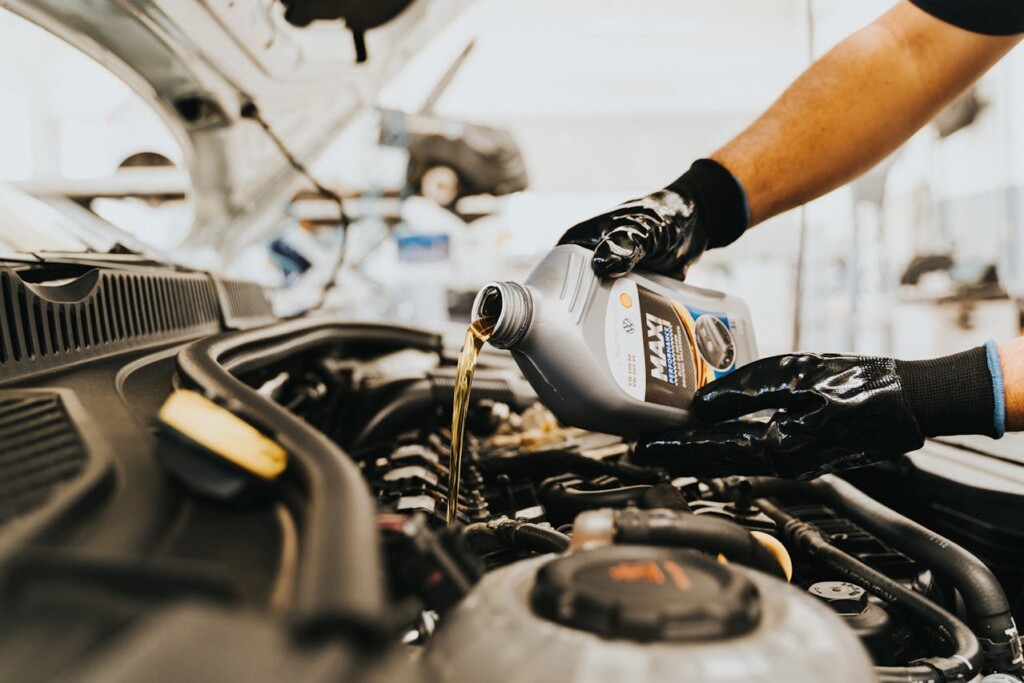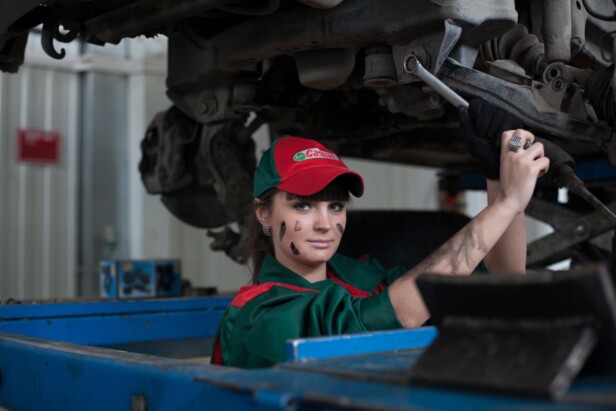Auto shops working with fuels, solvents, oils, or batteries face a complex web of permit requirements across three government levels. The Woodlands area falls under Harris County jurisdiction, where the 2021 International Fire Code mandates operational permits for hazardous materials handling above specific thresholds.
This regulatory framework spans local fire code compliance, Texas environmental oversight through TCEQ, and federal transportation requirements under FMCSA. Each layer addresses different aspects of hazardous materials management from storage and waste handling to air quality and transportation safety.
What Local Permits Apply Near The Woodlands, And How Do You Apply?

Harris County operates under the 2021 International Fire Code Section 105, which mandates operational permits for auto shops storing, transporting on site, dispensing, using, or handling hazardous materials. The electronic application system streamlines the permit process, with Fire Code Officials conducting thorough reviews and scheduling inspections when necessary.
We coordinate closely with Harris County Fire Marshal’s Office during construction projects that involve hazardous materials handling. The permitting process ensures that all safety protocols are in place before operations begin.
Required Operational Permits For Auto Shops
Auto repair facilities typically need multiple permits beyond the basic hazardous materials operational permit. Compressed gases permits cover storage and use of acetylene, oxygen, and other pressurized materials common in welding and cutting operations. These permits ensure proper ventilation and storage protocols are followed.
Flammable and combustible liquids permits address the storage and handling of gasoline, diesel, brake fluid, transmission fluid, and cleaning solvents. The permit requirements vary based on storage quantities and container types. Motor fuel-dispensing facilities require additional permitting when shops operate fuel pumps or mobile refueling services.
Spraying or dipping operations, common in paint booths and parts cleaning, require specific permits due to fire hazards from volatile organic compounds. Tire storage permits become necessary when shops accumulate significant quantities of new or used tires, addressing both fire load and pest control concerns.
Application Process And Documentation
The Harris County Fire Code Hub provides comprehensive application resources, including permit standards and detailed guidelines for each permit type. All applications must be submitted electronically through their online portal, with no paper submissions accepted.
Applicants submit general business information, operational descriptions, and select appropriate permit categories. Some businesses require multiple permits, and the Fire Code Official may request additional documentation during review. Magnesium work, occasionally used in auto restoration, falls under the Hazardous Materials operational permit rather than requiring separate authorization.
After application submission, the Fire Code Official conducts a thorough review and determines inspection requirements. Successful applicants receive permit issuance notification along with renewal schedules and any special conditions specific to their operations.
Contact Information And Site Visits
Harris County Fire Marshal’s Office maintains strict appointment-only policies, requiring advance scheduling for all site visits. The primary contact email, FMOSupport@fmo.hctx.net, handles permit inquiries and application support. Phone consultations are available at (713) 274-1700 during regular business hours.
This structured approach ensures consistent application of fire safety standards while providing clear pathways for permit acquisition. The electronic system reduces processing delays and maintains comprehensive records for future inspections and renewals.
What Texas Environmental Rules Affect Auto Shops Handling Hazardous Materials?
TCEQ oversees comprehensive environmental requirements that apply before you construct, modify, or operate your auto shop. The Texas Commission on Environmental Quality mandates proper air authorization based on your facility’s emissions profile. You must secure either de minimis status, a permit by rule, or a State Air Quality Permit depending on your operational scope.
Air authorization requirements vary by facility size and activity. De minimis facilities emit minimal pollution and face fewer regulatory burdens. Permit by rule covers standard operations meeting specific conditions. State Air Quality Permits apply to larger facilities with significant emissions potential.
Waste Classification and Generator Status Requirements
We must identify every waste stream your shop generates and determine whether each qualifies as hazardous waste. This determination follows federal EPA criteria: wastes are hazardous if specifically listed or if they exhibit characteristics of toxicity, reactivity, ignitability, or corrosivity. The classification process requires thorough documentation and periodic review.
Texas uses an eight-digit waste coding system that must appear on all manifests and reporting documents. These Texas Waste Codes combine a four-digit sequence number, three-digit form code, and one-digit classification code. Accurate coding prevents regulatory violations and ensures proper waste tracking.
Your generator status depends on monthly hazardous waste quantities. Conditionally Exempt Small Quantity Generators (CESQG) produce less than 220 pounds monthly. Small Quantity Generators (SQG) generate between 220 and 2,200 pounds monthly. Large Quantity Generators (LQG) exceed 2,200 pounds monthly or produce any amount of acutely hazardous waste above 2.2 pounds.
On-Site Storage and Labeling Protocols
Hazardous waste containers require specific labeling with “Hazardous Waste,” accumulation start dates, and contents identification. We maintain all containers in good condition and keep them closed except during waste addition or removal. Weekly inspections for SQGs and daily inspections for LQGs document container integrity.
Storage location matters significantly for safety and compliance. Ignitable and reactive wastes must remain at least 50 feet from property lines. Secondary containment systems prevent environmental contamination from spills or leaks. Container compatibility with waste contents prevents dangerous chemical reactions.
Time limits govern on-site accumulation. CESQGs have no time restrictions but cannot exceed 2,200 pounds total. SQGs may store waste for 180 days (270 days if shipping over 200 miles). LQGs face stricter 90-day limits with higher inspection requirements.
Transportation and Manifesting Requirements
Off-site waste shipments require registered transporters and TCEQ-approved disposal facilities. The Uniform Hazardous Waste Manifest tracks waste from generation to final disposal, creating legal accountability throughout the process. Each manifest copy serves specific documentation purposes for generators, transporters, and disposal facilities.
We initiate exception reporting if signed manifests are not returned within 35 days. Contact the transporter and disposal facility immediately to locate missing documentation. If the signed copy remains missing after 45 days total, notify TCEQ in writing. This tracking system ensures waste reaches authorized destinations.
Manifest accuracy prevents costly violations and protects your facility from liability. Include correct waste codes, quantities, and hazard classifications. Employee training on manifest completion reduces errors and demonstrates compliance commitment during inspections.
Wastewater Management and Discharge Options
Every wastewater stream requires hazardous waste determination using the same criteria applied to solid wastes. Process knowledge and laboratory testing help establish proper classification. Document all determinations for regulatory review and update classifications when processes change.
Nonhazardous wastewater discharge options include sanitary sewer systems and surface water bodies. Publicly Owned Treatment Works (POTW) discharge requires written approval and may involve pretreatment requirements. Industrial users often face specific discharge limits and monitoring obligations.
Surface water discharge demands TCEQ permit authorization through the Texas Pollutant Discharge Elimination System. We evaluate discharge volumes, pollutant concentrations, and receiving water quality before permit issuance. Unpermitted surface water discharge violates state and federal law.
How Should Shops Manage Common Automotive Wastes And Storage Tanks?

Managing automotive waste streams properly protects your shop from penalties and keeps operations compliant with TCEQ requirements. Each waste type has specific handling, storage, and disposal rules that we follow to maintain regulatory compliance.
Used Oil Storage And Disposal Requirements
We store used oil in containers that remain in good condition and display clear “Used Oil” labels. Spill cleanup happens immediately, and we report any spills of 25 gallons or more to TCEQ at 800-832-8224 within required timeframes.
Only registered processors can dispose of used oil for recycling. Self-transport remains an option for up to 55 gallons at a time to registered processors or recyclers without needing transporter registration. Larger volumes require registered used-oil transporters who maintain proper EPA identification numbers.
Used Oil Filter Management Protocols
Used oil filters require complete removal of free-flowing oil before storage. We store drained filters in closed, labeled containers that prevent leaks and contamination. The EPA excludes non-terne plated filters from hazardous waste classification when properly hot-drained through puncturing, crushing, or dismantling methods.
Transport options include registered transporters for larger shipments or self-transport of no more than two 55-gallon containers at a time. Each shipment needs proper documentation with a bill of lading that tracks the filters to approved recycling facilities.
Lead-Acid Battery Handling Standards
Lead-acid batteries go directly to reclamation facilities that process the lead and plastic components. Storage and transport practices must prevent acid spills that could damage equipment or create environmental hazards. We use compatible containment like plastic spill pallets for batteries with cracked housings.
Battery suppliers often accept spent batteries as part of new battery purchases. This closed-loop system reduces handling requirements while ensuring proper recycling through established manufacturer networks.
Scrap Tire Generator Requirements
Registration as a scrap-tire generator becomes mandatory when storing more than 500 tires outside or more than 2,000 in enclosed, lockable containers. TCEQ-registered transporters handle tire shipments with proper manifesting systems that track disposal destinations.
Landfill disposal requires tires to be split, quartered, or shredded before acceptance. Most tires go to recycling facilities that convert them into rubber products, fuel, or civil engineering applications that provide better environmental outcomes than disposal.
Antifreeze Testing And Disposal Options
We test antifreeze to determine hazardous characteristics before disposal decisions. Antifreeze mixed with solvents or containing high lead concentrations requires hazardous waste management. Recycling provides the preferred option even for hazardous antifreeze formulations.
Nonhazardous antifreeze may discharge to sanitary sewers only with written approval from the local publicly owned treatment works (POTW). Most recycling facilities accept both ethylene glycol and propylene glycol formulations for reprocessing into new antifreeze products.
Storage Tank Compliance Requirements
Underground storage tanks (USTs) and aboveground storage tanks (ASTs) follow TCEQ requirements for registration, release reporting, corrective action, and recordkeeping. Tank capacity and contents determine specific compliance obligations that we monitor through regular inspections.
Federal spill prevention control and countermeasures (SPCC) requirements apply when UST capacity reaches 43,000 gallons or larger, or when total AST capacity exceeds 1,320 gallons. These facilities need written SPCC plans that outline prevention measures and response procedures for potential releases.
When Do Federal Permits Or Standards Apply (Transport And Air)?
Federal requirements kick in when auto shops transport hazardous materials commercially or when specific air quality standards apply to operations. The type and scale of hazardous materials handling determines which federal permits shops need.
Motor carriers transporting certain hazardous materials must obtain a Hazardous Materials Safety Permit from FMCSA. This requirement applies to carriers hauling radioactive materials, large quantities of explosives, toxic materials by inhalation, or compressed natural gas in bulk packaging over 3,500 gallons capacity. Carriers apply using Form MCS-150B, which also establishes their USDOT Number if they lack one.
FMCSA Hazardous Materials Safety Permit Requirements
The FMCSA Hazardous Materials Safety Permit applies to motor carriers, not individual auto shops. However, shops that transport hazardous materials using their own vehicles may need this permit. The permit covers highway route-controlled quantities of radioactive materials and more than 25 kilograms of certain explosives.
Carriers must maintain satisfactory safety ratings and security programs to qualify. The permit process requires completing Form MCS-150B, which combines motor carrier identification reporting with hazmat permit applications. This form satisfies both USDOT Number requirements and safety permit applications simultaneously.
Federal Air Quality Standards For Auto Shops
Auto shops using halogenated solvent cleaners must comply with National Emission Standards for Hazardous Air Pollutants regulations. These NESHAP standards control emissions from degreasing operations and parts cleaning activities. Shops must use approved equipment and follow specific operating procedures to minimize air pollution.
Refrigerant recovery operations require EPA-approved equipment and certified technicians. All recovered refrigerants must go to EPA-approved reclamation facilities rather than being released to the atmosphere. This requirement protects ozone layer integrity and prevents harmful emissions.
Gasoline dispensing facilities in ozone nonattainment areas face additional vapor recovery requirements. The Houston-Galveston area falls under nonattainment designation, triggering Stage I and Stage II vapor recovery standards. Stage I controls vapors during fuel delivery to underground storage tanks, while Stage II captures vapors during vehicle refueling operations.
Conclusion And Next Steps

Auto shop compliance with hazardous materials regulations requires coordinated attention to local fire permits, state environmental rules, and federal transport standards. We approach this systematically by addressing each regulatory layer and maintaining comprehensive documentation throughout our operations.
Begin by confirming your Harris County permit requirements. If your shop stores, handles, or transports hazardous materials on-site, apply for the appropriate operational permit through the Fire Code Hub’s electronic system. We coordinate closely with the Fire Code Official during the review process and prepare for any required inspections. The permit renewal schedule varies by activity type, so we maintain a tracking system to ensure continuous compliance.
Technical assistance remains available through TCEQ’s Small Business and Local Government Assistance program. This free, confidential service helps clarify regulatory requirements and supports compliance planning. We recommend establishing contact with this resource early in your compliance development process.
Contact EB3 Construction for construction projects that require coordinated environmental compliance management.




